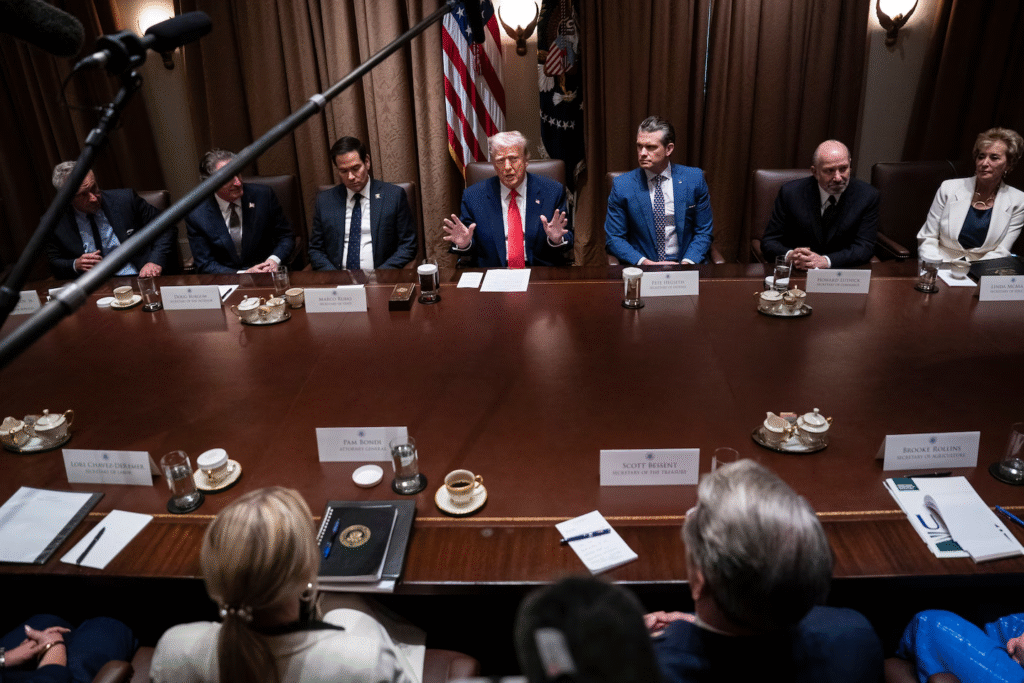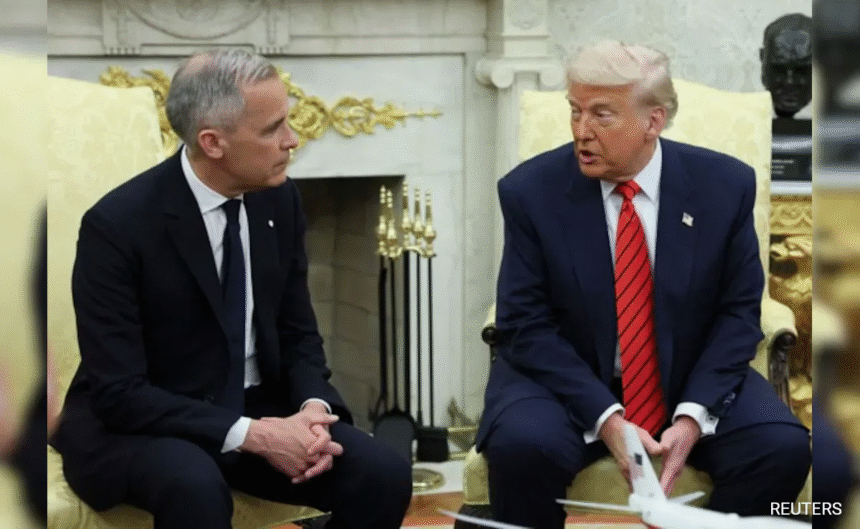Trump Slaps 35% Tariff on Canadian Goods from August 1; Eyes 15–20% Duties on Other Nations
Starting August 1, Trump imposes a 35% tariff on Canadian imports and signals 15–20% tariffs on other countries. Global trade faces renewed tension
Washington D.C., July 11, 2025 — In a bold and controversial move that could redefine global trade dynamics, former U.S. President Donald Trump has announced a sweeping 35% tariff on Canadian imports, set to take effect from August 1, 2025. The decision marks a significant escalation in Trump’s protectionist trade agenda, echoing the “America First” economic policies from his previous term.

Alongside the new tariff on Canada, Trump has also indicated plans to impose 15% to 20% tariffs on a range of goods from other key U.S. trade partners, signaling a broader effort to recalibrate America’s global trade relationships.
The announcement has sparked shockwaves across North American markets, triggered strong reactions from Canadian officials, and raised concerns among economists and global trade experts about the potential consequences for international commerce and economic stability.
Speaking at a campaign rally in Michigan, Trump declared the new tariff policy as “long overdue,” blaming Canada for what he described as decades of unfair trade practices that have “ripped off American workers and destroyed U.S. manufacturing.”
The tariff would apply to a wide range of Canadian exports, including:
- Automobiles and auto parts
- Agricultural products (wheat, dairy, beef)
- Wood and lumber
- Aluminum and steel
- Packaged food and consumer goods
According to early estimates from trade analysts, the 35% duty could impact over $90 billion worth of Canadian exports annually, significantly raising the cost of Canadian goods in U.S. markets and likely prompting retaliatory action from Ottawa.
Canadian Prime Minister Chrystia Freeland wasted no time in responding, calling the tariff “an unjustified and hostile act” that threatens the long-standing friendship and trade partnership between the two nations.
She confirmed that the Canadian government is preparing countermeasures, which could include tariffs on U.S. agricultural goods, tech products, and energy exports.
Trade experts warn that if a full-scale trade war erupts between the two countries, it could lead to job losses on both sides of the border, supply chain disruptions, and rising consumer prices — especially in the automotive and food sectors.
Trump’s mention of 15–20% tariffs for other nations has alarmed European and Asian trade partners, including Germany, South Korea, Japan, and Mexico. While no country was named explicitly, Trump’s rhetoric suggests that the U.S. is preparing for a larger realignment of trade policy focused on reducing the trade deficit.

The move is widely seen as an attempt to resurrect his hardline trade stance ahead of the 2026 midterm elections, as he builds momentum with a renewed emphasis on economic nationalism and domestic manufacturing.
A senior Trump campaign adviser stated anonymously that a list of countries and product categories targeted for future tariffs is “already being prepared” and could include:
- Consumer electronics from China and South Korea
- Pharmaceuticals from India
- Automobiles from Germany and Japan
- Textiles from Southeast Asia
Economists and financial institutions have expressed deep concern over the announcement, with some forecasting that aggressive tariff policies could:
- Increase inflationary pressure in the U.S.
- Trigger retaliatory tariffs that hurt American exporters
- Disrupt supply chains across sectors such as autos, tech, and food
- Lower GDP growth in both the U.S. and affected countries
The U.S. Chamber of Commerce issued a cautious statement warning against protectionism:
Stock markets reacted with immediate volatility, with shares of auto manufacturers, agricultural exporters, and retail chains dipping significantly in morning trading. Canadian markets also took a hit, with the Toronto Stock Exchange down 2.1% on the day of the announcement.
U.S. and Canadian automakers have raised the alarm over the new tariffs. Major manufacturers like General Motors, Ford, and Stellantis rely heavily on cross-border supply chains, particularly with factories in Ontario. A 35% tariff could lead to:
- Increased vehicle prices in the U.S.
- Production slowdowns
- Potential layoffs
Agriculture
Canada is a major exporter of dairy, beef, and grains to the U.S. Farmers on both sides of the border are expected to suffer, with rising input costs and restricted market access. U.S. agricultural lobbies, including the American Farm Bureau Federation, are urging Trump to reconsider.
Retailers who import Canadian packaged goods — especially grocery chains and online marketplaces — warn that prices could rise for consumers, particularly for dairy products, maple syrup, and meat items.
With the August 1 implementation date approaching, diplomatic channels between Washington and Ottawa are likely to heat up. While some supporters of Trump applaud the move as a step toward restoring America’s industrial base, critics argue it risks triggering a trade war that could damage economic recovery efforts post-pandemic.
The announcement also places pressure on President Joe Biden and other political figures to respond or comment, potentially dragging trade policy into the center of the 2026 election cycle.
Read Also : Gurugram Rain Chaos: 400+ Distress Calls, Cratered Roads, Dozens of Cars Stranded Amid Flood Panic








